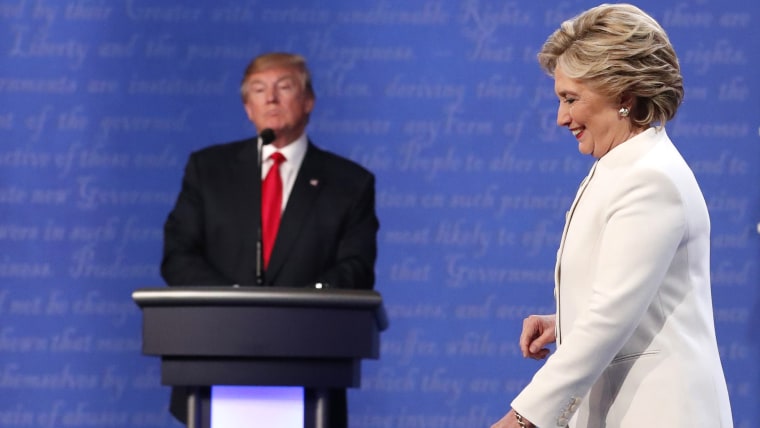During last year's campaign, whenever Hillary Clinton would criticize Donald Trump, it was a near certainty that Trump would then made the identical accusation against Clinton. After a while, this got a little creepy.
Clinton accused Trump of being unstable and reckless, so Trump said Clinton is "unstable" and "reckless." Clinton said Trump mistreated women, so Trump said Clinton mistreated women. Clinton accused Trump of bigotry, so Trump said Clinton's a "bigot." Clinton questioned Trump's temperament, so Trump said Clinton had a bad "temperament." Clinton said Trump makes a poor role model for children, so Trump said Clinton sets "a terrible example for my son and the children in this country."
And, of course, Clinton accused Trump of being a "puppet" for his allies in Moscow, Trump, showing all of the sophistication of a slow toddler, responded, "No puppet. No puppet. You're the puppet. No, you're the puppet."
This pattern of projection, in which Trump assigns some of his worst qualities onto those who criticize him, wasn't just a campaign tactic. It's also a staple of his presidency, as White House Press Secretary Sarah Huckabee Sanders helped demonstrate during yesterday's briefing. Asked about the criminal charges against some of Trump's campaign staff, Sanders deflected in an amazing way:
"The real collusion scandal, as we've said several times before, has everything to do with the Clinton campaign, Fusion GPS, and Russia."There's clear evidence of the Clinton campaign colluding with Russian intelligence to spread disinformation and smear the president to influence the election."
Trump himself said on Friday that Clinton colluded with Russia. A day later, his press secretary added that the evidence of Clinton-Russia collusion is "indisputable."
There's nothing to suggest these folks were kidding. Trump and his team apparently expect the public to take this line of attack seriously.
The American public is honestly supposed to believe that Russia attacked the election, stole Democratic documents, and took a series of strategic steps to undermine the Clinton campaign -- all while Clinton colluded with Russia.
As proof, the president's allies point to a dossier compiled by a research firm that investigated ties between Trump and Russia. The research was originally funded by Trump's Republican critics during the presidential primaries, and Democrats financed the effort during the general election.
Obviously, to see this as evidence of collusion is insulting to Americans' intelligence. We've grown accustomed to some pretty bizarre claims out of this White House, but the idea that Hillary Clinton colluded with the same foreigners who tried to defeat her is plainly dumb.
So why bother? Part of this, I suspect, is that Republicans are divided on several fronts, and going after Hillary Clinton, five years removed from public office and one year removed from an unsuccessful campaign, is one of the few things GOP leaders can all embrace with enthusiasm. Whether it makes sense or not is irrelevant.
Let's also not discount the effects of panic. As Special Counsel Robert Mueller's investigation moves forward, members of Trump World are indicted, the president and his team are left to scramble, looking for any kind of marginally coherent arguments that might somehow help them politically.
There's also the goal of muddying the waters in the hopes of spreading public confusion. Trump World thinks it will benefit if, when the subject of collusion with Russia comes up, the issue is just a partisan food fight, with each side of the partisan divide lobbing the same accusation at the other. It may be mind-numbing agitprop from West Wing officials acting in bad faith, but the White House and its allies seem convinced it might work anyway.
As New York's Jon Chait noted the other day:
In some ways the theory of alt-collusion mirrors the propaganda methods used by Putin himself. When William Browder publicizes Russia's murder of crusading lawyer Sergei Magnitsky, Russia turns around and implies that maybe Browder is the one who murdered Magnitsky. The accusation is preposterous, but that doesn't matter. The purpose is to create an offsetting accusation against the accuser, so that the average bystander can only puzzle at the spectacle of two sides making the same allegation against each other.This method can work if you have enough mouthpieces who are sufficiently devoid of skepticism or intellectual self-respect to be willing to spread your obviously absurd message. A key fact that Trump has discovered, and which has enabled his takeover of the Republican Party, is that this is a resource the American right has in abundant supply.
Or put another way, "No puppet. No puppet. You're the puppet."
